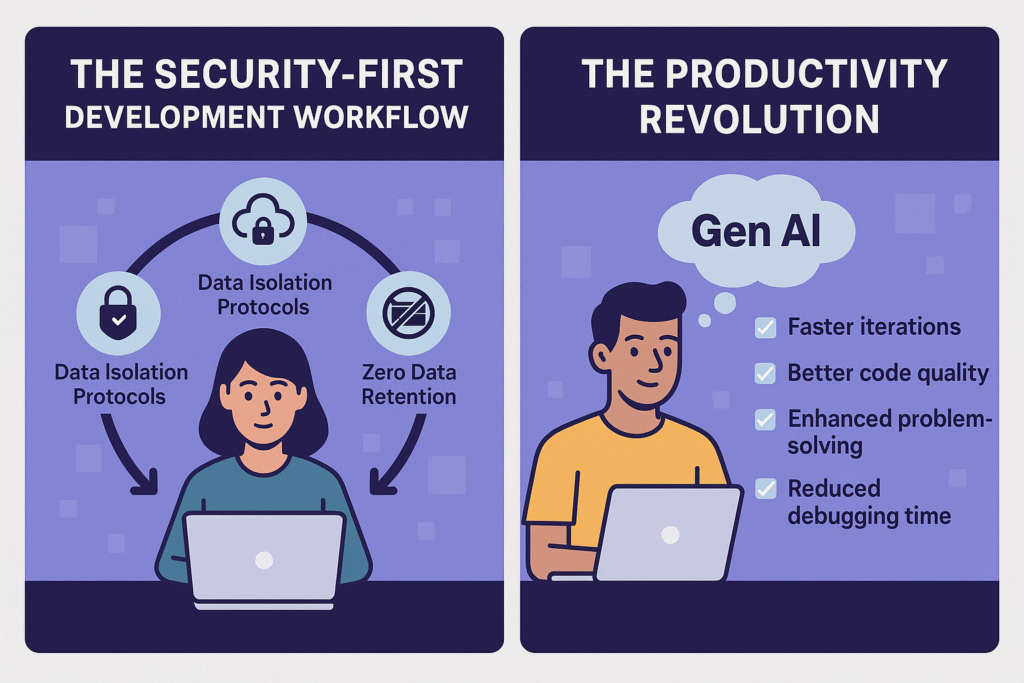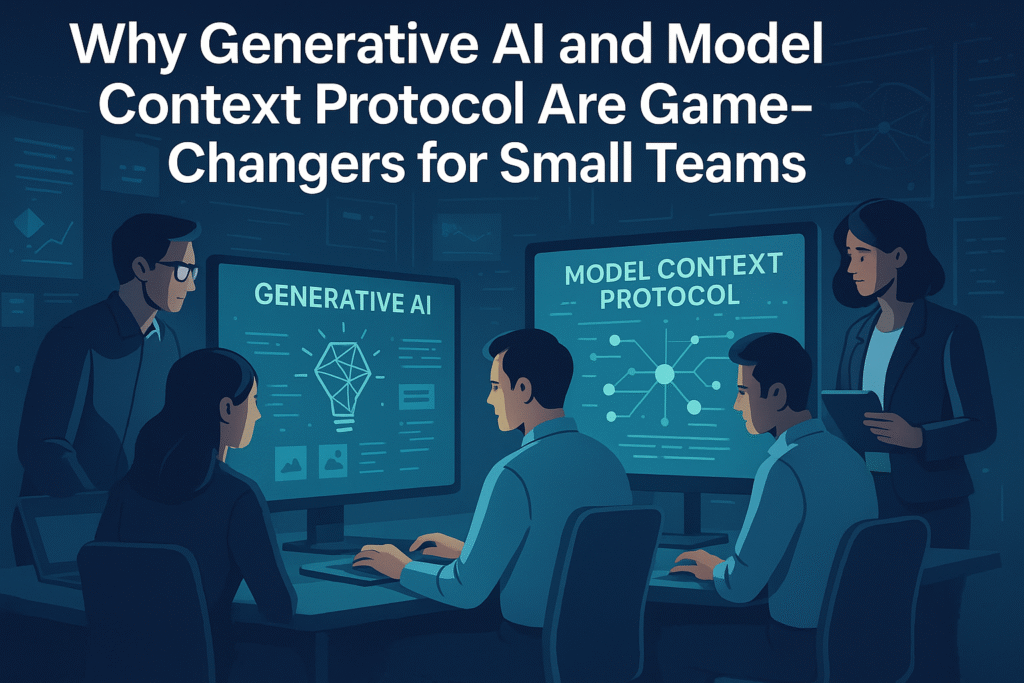How TekMedia transformed from skeptics to believers in the Gen AI revolution through secure research and development practices ?
In the fast-moving world of technology, small teams face a unique challenge: delivering enterprise-level solutions with startup-level resources. At TekMedia, we've discovered that Generative AI (Gen AI) and the Model Context Protocol (MCP) aren't just trendy buzzwords—they're the secret weapons that level the playing field for small, ambitious teams.
Our journey with these technologies wasn't planned. It evolved organically as we faced real problems and discovered unexpected solutions through carefully controlled research projects. Here's how our perspective shifted from cautious curiosity to complete conviction, while maintaining the highest standards of data security and privacy.
Chapter 1: The Reluctant Beginning - Generative AI as a Helper Tool
Like most small teams, we started with healthy skepticism. Could AI really help us code better? Or was it just another shiny distraction? More importantly, could we use it safely without compromising our clients' data?
Our first experiment was modest and carefully controlled: using Generative AI to generate simple code snippets and draft basic documentation for internal research projects. We established strict protocols from day one—all experiments were conducted on isolated development environments with no production data exposure.
The Early Wins:
- Code snippet generation that actually worked
- Automated documentation drafts that needed minimal editing
- Quick solutions to common programming problems
- Reduced time spent on Stack Overflow hunts
But here's what really caught our attention: our developers weren't just saving time—they were staying in the flow state longer. Less context switching meant more deep work, and more deep work meant better solutions.
This is where MCP entered the picture. The Model Context Protocol provided a standardized way to connect AI models to our research data sources and development tools, eliminating the friction of integrating AI capabilities into our established workflows—all while maintaining complete data isolation.
Our Security-First Development Workflow
What surprised us most was how naturally security integrated into our daily development process. Modern AI tools come with built-in privacy features that made secure development feel effortless rather than burdensome.
Privacy-by-Design Development: Our team quickly adopted what we call "privacy-first coding habits" using the security features already built into our AI tools. Claude Code, our primary development assistant, became particularly valuable because of its built-in security architecture:
- Zero Data Retention API: We use API keys from zero data retention organizations with Claude Code, which means chat transcripts are never retained on Claude's servers. Local sessions are stored for up to 30 days for resumption purposes, but this behavior is fully configurable
- Terminal-Based Security: Claude Code runs directly in our terminal environment, giving us complete control over data flow and eliminating unnecessary cloud dependencies
- Local Processing Priority: We prioritize AI tools that process code locally rather than sending everything to cloud servers
- Ephemeral Sessions: Development environments are spun up fresh for each session, automatically isolating research work from production systems

Built-in Security Features We Leverage:
- "No Model Training" Guarantees: Claude's commitment not to use conversations for training future models, ensuring that both inputs and outputs remain strictly private
- Enterprise Privacy Controls: Enterprise-grade security features like SSO, role-based permissions, and admin tooling that help protect data and team access
- Configurable Local Storage: Claude Code's local session storage (up to 30 days) is fully configurable, allowing us to set even shorter retention periods or disable local storage entirely for maximum security
- Session Isolation: Each development session runs in its own isolated environment with automatic cleanup
- Audit Logging: Built-in logging helps us track exactly what data touches AI systems (spoiler: it's only sanitized research code)
Chapter 2: The Productivity Revolution
As we got comfortable with Generative AI as a helper in our research environment, something unexpected happened. Our productivity didn't just improve incrementally—it transformed completely. Generative AI began suggesting optimizations we hadn't considered. It caught potential bugs before they became problems. It even helped us make better architectural decisions by quickly prototyping different approaches in our isolated research environment. What started as a time-saver became a thinking partner.
The Productivity Multipliers:
- Faster iterations: Ideas could be tested and refined in minutes, not hours
- Better code quality: AI-suggested improvements reduced technical debt
- Enhanced problem-solving: Multiple solution approaches generated instantly
- Reduced debugging time: Potential issues caught during development
MCP amplified these benefits significantly. By enabling seamless integration between LLM applications and our controlled research data sources, MCP allowed our AI assistants to access sanitized project data, understand our research codebase structure, and provide contextually relevant suggestions—all within our secure development environment.
Research Environment Benefits:
- All experiments conducted on non-production, anonymized datasets
- AI tools trained only on publicly available or internally generated research code
- Complete audit trails of all AI interactions and suggestions
- Ability to validate AI recommendations before any production implementation
The result? Our small team of five began delivering research prototypes and proof-of-concepts that typically required teams of fifteen. We weren't just competing with larger organizations anymore; we were outpacing them in innovation speed.
Chapter 3: The Advanced Frontier - Sophisticated Code Generation
Confidence breeds ambition. As our skills with Generative AI matured within our secure research framework, we pushed the boundaries of what was possible.
We moved beyond simple snippets to generating entire research modules. Complex algorithms, intricate data structures, sophisticated integrations—Generative AI became our co-pilot for advanced development challenges in our controlled environment. This wasn't about replacing human creativity; it was about amplifying it safely.
Advanced Research Applications:
- Context-aware code generation: AI that understands our research codebase patterns
- Intelligent refactoring: Automated code improvements based on research project patterns
- Cross-system integration: AI-generated connectors between development tools
- Performance optimization: Context-driven suggestions for research system improvements
Enhanced Security Measures for Advanced Use:
- Implementation of clear data provenance and governance practices
- Cross-functional AI leads designated for security oversight
- Regular security assessments of AI-generated code before any production consideration
- Robust data protection measures and strengthened monitoring capabilities
MCP's formal protocol specification and software development kits made it possible to create custom connections between our AI tools and sanitized internal research systems. Our AI assistants could now access our research databases, understand our development pipelines, and interact with our project management tools—all while maintaining strict data isolation.
The Small Team Advantage: Why Gen AI + MCP Is Essential
For small teams, every advantage matters. Here's why Gen AI and MCP aren't just helpful—they're essential, especially when implemented with proper security controls:
1. The Context Multiplier
Small teams wear many hats. MCP ensures your AI tools understand the full context of your research work—from code repositories to project requirements to deployment environments—without exposing sensitive production data.
2. The Integration Accelerator
MCP standardizes how AI applications connect with external tools and data sources within controlled environments, eliminating the custom integration work that typically consumes small team resources.
3. The Efficiency Amplifier
Gen AI with proper context through MCP eliminates routine tasks, reduces errors, and accelerates development cycles in research environments, allowing for safer validation before production deployment.
4. The Skill Democratizer
Not everyone on your team needs to be a senior developer. Generative AI with MCP-provided context democratizes expertise while maintaining quality standards and security protocols.
5. The Competitive Edge
Large organizations move slowly. Small teams with Generative AI and MCP can pivot quickly, experiment freely in controlled environments, and deliver solutions faster than traditional development approaches.
Getting Started: The TekMedia Secure Approach
If you're considering Generative AI and MCP for your small team, here's our recommended secure approach:
Phase 1: Foundation Building
- Start with basic Generative AI tools for simple, non-sensitive research tasks
- Establish data isolation protocols and zero-retention policies
- Explore local MCP server support for secure data integration
- Choose one internal research project as a pilot
- Set clear success metrics and security benchmarks
Phase 2: Context Integration
- Implement MCP servers for sanitized research data sources
- Connect AI tools to isolated development environments
- Train your team on context-aware AI workflows and security protocols
- Measure productivity improvements while maintaining security compliance
Phase 3: Advanced Orchestration
- Build custom MCP servers for specialized research tools
- Create AI workflows that span multiple isolated systems
- Experiment with autonomous development tasks in controlled environments
- Scale successful patterns across research projects before production consideration
Security Validation Gateway
Before any AI-generated code reaches production:
- Comprehensive security review and testing
- Manual validation of all AI suggestions
- Compliance checks against industry standards
- Implementation of strong data protection measures and ethical guidelines
The Technical Reality
The Model Context Protocol was originally released in November 2024 and has rapidly gained adoption across the industry. MCP is based on a client-server architecture that standardizes how LLMs access tools, data, and prompts from external sources, making it easier than ever to build sophisticated AI-powered development workflows with proper security controls.
Security-First Implementation:
- All MCP servers run in isolated environments
- Data flows are monitored and logged for audit purposes
- Robust security measures including encryption and access controls protect sensitive information
- Regular security assessments ensure continued compliance
For small teams, this timing is perfect. The protocol is mature enough for production use but new enough that early adopters gain significant competitive advantages—especially those who implement it with proper security safeguards.
The Future Is Now
The question isn't whether Generative AI and MCP will become essential for small teams—they already are. The question is whether you'll embrace them early with proper security controls and gain a competitive advantage, or adopt them later and play catch-up.
At TekMedia, our journey from skeptics to believers has been transformative. We're not just building software faster; we're building better software with a smaller team, lower costs, and higher satisfaction—all while maintaining the highest standards of data security and client privacy.
Our Commitment to Security:
- Zero production data exposure to AI systems
- Complete data isolation for all AI experiments
- Regular security audits and compliance reviews
- Transparent communication with clients about our AI usage policies
Our AI tools understand our research context, our development processes, and our security requirements—making them true partners in innovation rather than just sophisticated autocomplete tools.
The tools are ready. The protocol is standardized. The security frameworks are proven. The only question left is: what will your team build next?
Ready to explore how Generative AI and MCP can transform your small team while maintaining enterprise-grade security? Connect with us at TekMedia to share experiences and insights from the front lines of the secure AI revolution.

